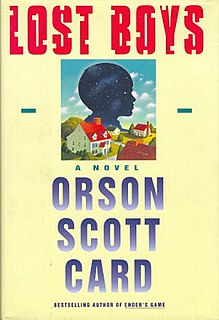
Lost Boys (1992) is a horror novel by American author Orson Scott Card. The premise of the novel revolves around the daily lives of a Mormon family, and the challenges they face after a move to North Carolina. The story primarily follows the family's troubles at work, church, and the oldest child Stevie's difficulty fitting in at school, which lead to him becoming increasingly withdrawn.

The Black Sox Scandal was a Major League Baseball game-fixing scandal in which eight members of the Chicago White Sox were accused of throwing the 1919 World Series against the Cincinnati Reds in exchange for money from a gambling syndicate led by Arnold Rothstein. As a response, the National Baseball Commission was dissolved and Judge Kenesaw Mountain Landis was appointed to be the first Commissioner of Baseball, and given absolute control over the sport to restore its integrity.
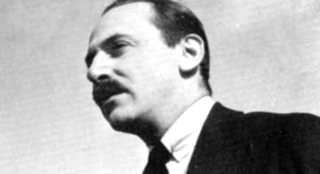
Nathanael West was an American writer and screenwriter. He is remembered for two darkly satirical novels: Miss Lonelyhearts (1933) and The Day of the Locust (1939), set respectively in the newspaper and Hollywood film industries.

Hugh Ambrose Jennings was an American professional baseball player, coach and manager from 1891 to 1925. Jennings was a leader, both as a batter and as a shortstop, with the Baltimore Orioles teams that won National League championships in 1894, 1895, and 1896. During those three seasons, Jennings had 355 runs batted in and hit .335, .386, and .401.
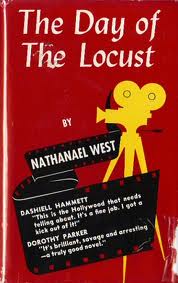
The Day of the Locust is a 1939 novel by American author Nathanael West set in Hollywood, California. The novel follows a young artist from the Yale School of Fine Arts named Tod Hackett, who has been hired by a Hollywood studio to do scene design and painting. While he works he plans an important painting to be called "The Burning of Los Angeles," a portrayal of the chaotic and fiery holocaust which will destroy the city. While the cast of characters Tod befriends are a conglomerate of Hollywood stereotypes, his greater discovery is a part of society whose "eyes filled with hatred," and "had come to California to die." This undercurrent of society captures the despair of Americans who worked and saved their entire lives only to realize, too late, that the American dream was more elusive than they imagine. Their anger boils into rage, and the craze over the latest Hollywood premiere erupts violently into mob rule and absolute chaos.

A Prayer for Owen Meany is the seventh novel by American writer John Irving. Published in 1989, it tells the story of John Wheelwright and his best friend Owen Meany growing up together in a small New Hampshire town during the 1950s and 1960s. According to John's narration, Owen is a remarkable boy in many ways; he believes himself to be God's instrument and sets out to fulfill the fate he has prophesied for himself.
Stalky & Co. is a novel by Rudyard Kipling about adolescent boys at a British boarding school. It is a collection of school stories whose three juvenile protagonists display a know-it-all, cynical outlook on patriotism and authority. It was first published in 1899 after the stories had appeared in magazines during the previous two years. It is set at a school dubbed "the College" or "the Coll.", which is based on the actual United Services College that Kipling attended as a boy.
The question of the origins of baseball has been the subject of debate and controversy for more than a century. Baseball and the other modern bat, ball, and running games — stoolball, cricket and rounders — were developed from folk games in early Britain, Ireland, and Continental Europe. Early forms of baseball had a number of names, including "base ball", "goal ball", "round ball", "fetch-catch", "stool ball", and, simply, "base". In at least one version of the game, teams pitched to themselves, runners went around the bases in the opposite direction of today's game, much like in the Nordic brännboll, and players could be put out by being hit with the ball. Just as now, in some versions a batter was called out after three strikes.
Town ball, townball, or Philadelphia town ball, is a bat-and-ball, safe haven game played in North America in the 18th and 19th centuries, which was similar to rounders and was a precursor to modern baseball. In some areas—such as Philadelphia and along the Ohio River and Mississippi River—the local game was called Town Ball. In other regions the local game was named "base", "round ball", "base ball", or just "ball"; after the development of the "New York game" in the 1840s it was sometimes distinguished as the "New England game" or "Massachusetts baseball". The players might be schoolboys in a pasture with improvised balls and bats, or young men in organized clubs. As baseball became dominant, town ball became a casual term to describe old fashioned or rural games similar to baseball.

Captain J. Flint is a fictional golden age pirate captain who features in a number of novels, television series, and films. The original character was created by the Scottish writer Robert Louis Stevenson (1850–1894). Flint first appears in the classic adventure yarn Treasure Island, which was first serialised in a children's magazine in 1881, and later published as a novel in 1883.

"The Sandman" is a short story by E. T. A. Hoffmann. It was the first in an 1817 book of stories titled Die Nachtstücke.

William Benjamin Chapman was an American outfielder and manager in Major League Baseball who played for several teams. He began his career with the New York Yankees, playing his first seven seasons there.
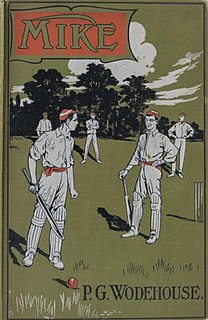
Mike is a school story by P. G. Wodehouse, first published on 15 September 1909 by Adam & Charles Black, London. The story first appeared in the magazine The Captain, in two separate parts that were collected together in the original version of the book; the first part, originally called Jackson Junior, was republished in 1953 under the title Mike at Wrykyn, while the second half, called The Lost Lambs in its serialised version, was released as Enter Psmith in 1935 and then as Mike and Psmith in 1953. Although Mike was one of Wodehouse's earlier books, Wodehouse thought it his best work.

A Cool Million: The Dismantling of Lemuel Pitkin is Nathanael West's third novel, published in 1934. It is a brutal satire of Horatio Alger's novels and their eternal optimism.

The Day of the Locust is a 1975 American satirical historical drama film directed by John Schlesinger and starring Donald Sutherland, Karen Black, William Atherton, Burgess Meredith, Richard Dysart, John Hillerman and Geraldine Page. Set in Hollywood, California just before World War II, the film depicts the alienation and desperation of a disparate group of individuals whose dreams of success fail to come true. The screenplay by Waldo Salt is based on the 1939 novel of the same title by Nathanael West.

Dan Daniel, born Daniel Margowitz, was an American sportswriter whose contributions over a long period led him to be called "the dean of American baseball writers".

The Winslow Boy is a 1948 British drama film adaptation of Terence Rattigan's 1946 play The Winslow Boy. It was made by De Grunwald Productions and distributed by the British Lion Film Corporation. It was directed by Anthony Asquith and produced by Anatole de Grunwald with Teddy Baird as associate producer. The adapted screenplay was written by de Grunwald and Rattigan based on Rattigan's play. The music score was by William Alwyn and the cinematography by Freddie Young.

Ragged Dick; or, Street Life in New York with the Boot Blacks is a Bildungsroman by Horatio Alger Jr., which was serialized in The Student and Schoolmate in 1867 and expanded for publication as a full-length novel in May 1868 by the publisher A. K. Loring. It was the first volume in the six-volume Ragged Dick Series and became Alger's best-selling work. The tale follows a poor bootblack's rise to middle-class respectability in 19th-century New York City. It had a favorable reception. Student and Schoolmate reported their readers were delighted with the first installment, and Putnam's Magazine thought boys would love the novel. The plot and theme were repeated in Alger's subsequent novels and became the subject of parodies and satires.
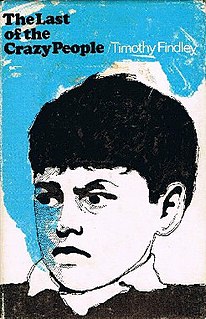
The Last of the Crazy People is the first novel of Canadian author Timothy Findley. It was published in 1967, in Britain, and later on in Canada, and was one of the first novels ever to be labelled as Southern Ontario Gothic.
"The Imposter" is a short story written by Nathanael West in the early 1930s; it was not published in West's lifetime and first appeared in The New Yorker on June 2, 1997, and in the Library of America edition of West's collected work: Novels & Other Writings. The story, told by a struggling writer and set among the expatriate community in 1920s Paris, deals with a failed sculptor named Beano Walsh, who claims he cannot create his art since the anatomy books are all wrong.